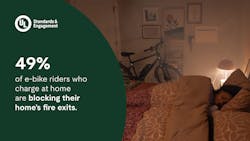“It just turned into a giant fireball. It looked like if I lit a Christmas tree up. The heat coming out immediately after was just insane.”
These are the words of a firefighter in New York City recounting his experience with an e-bike fire. His experience is becoming more common for firefighters. As the number of e-mobility devices on the market expands, so too have incidents of lithium-ion batteries going into thermal runaway, causing devastating fires.
UL Standards & Engagement has been developing safety standards to mitigate the risk posed by e-mobility devices and the lithium-ion batteries that power them. It has also been conducting research to understand how consumer awareness and behavior elevates the threat.
E-mobility riders do not understand the power source – or its risks.
A recent report by UL Standards & Engagement found that more than half of e-bike owners and e-scooter owners are unaware that their vehicles are powered by lithium-ion batteries. What consumers don’t know is leading to unsafe behavior. Nearly half of owners charge at home and block their home’s fire exit, 42% routinely charge overnight, and 23% charge their device unattended away from home. These practices are often cited as contributing factors to e-mobility fires and can have deadly consequences.
Lithium-ion battery fires are unlike any other fire.
Lithium-ion battery fires are intense, fast, and difficult to extinguish. Testing from the Fire Safety Research Institute shows an e-bike fire can fully engulf a room in flames in less than 20 seconds, compared to three minutes with a traditional fire. In densely populated areas, the fast spread of the fire poses a threat not only to the e-mobility device owner, but also to neighbors who may find themselves without homes.
This isn’t just a New York City problem.
While there has been a flurry of instances in New York City, e-bike fires are not geographically restricted. There have been fires in Massachusetts, Washington, D.C., Florida, and San Francisco. Many cities are taking steps to help mitigate the risk of future fires through legislation. New York City took action by passing legislation requiring that all e-mobility devices sold, leased, or rented must be certified to safety standards developed by UL Standards & Engagement. Other cities have incorporated safety standards into local incentive programs, helping to ensure their programs increase sustainability—not fires.
Standards can be a solution to lower the number of incidents throughout the country. Local, state, and federal leaders have the opportunity to enact policies that protect their citizens from further tragedy.
Fire safety professionals are on the front lines of these battery fires and have witnessed the devastation they cause. They can also be instrumental in reducing the threat.
To learn more and get involved, visit ebikesafety.ulse.org







